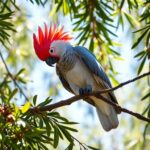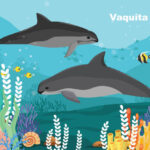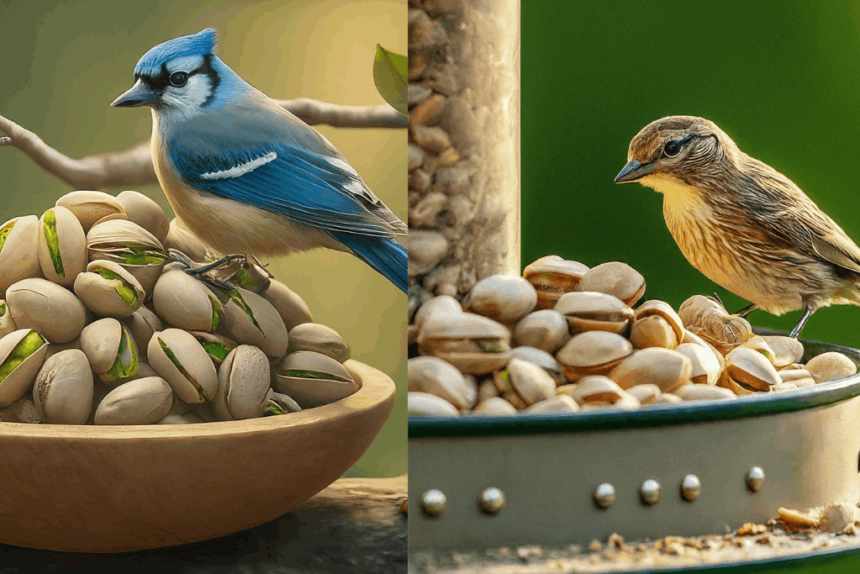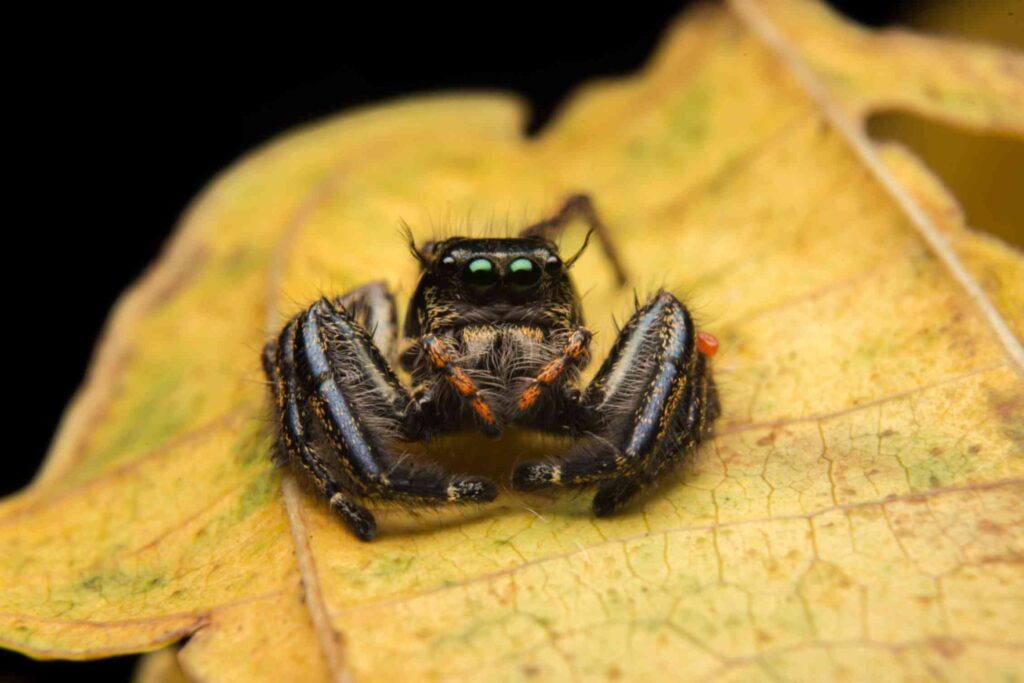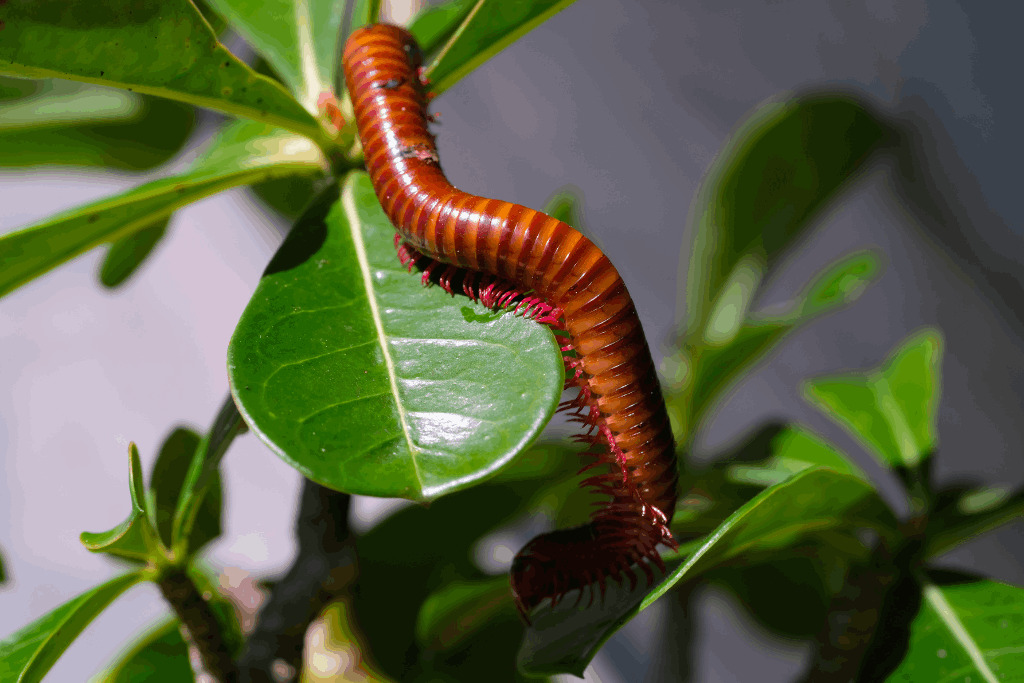Can Birds Eat Pistachios
As bird owners, we always want what’s best for our feathered friends. Often, we wonder if pistachios are safe for them. This article will look into the good and bad of giving pistachios to birds. We’ll help you decide if these nuts can be part of their diet.
Pistachios are tasty and look appealing to many birds. But, we need to know how they affect our birds’ health. Let’s see if pistachios can be a good snack or if there are better choices.
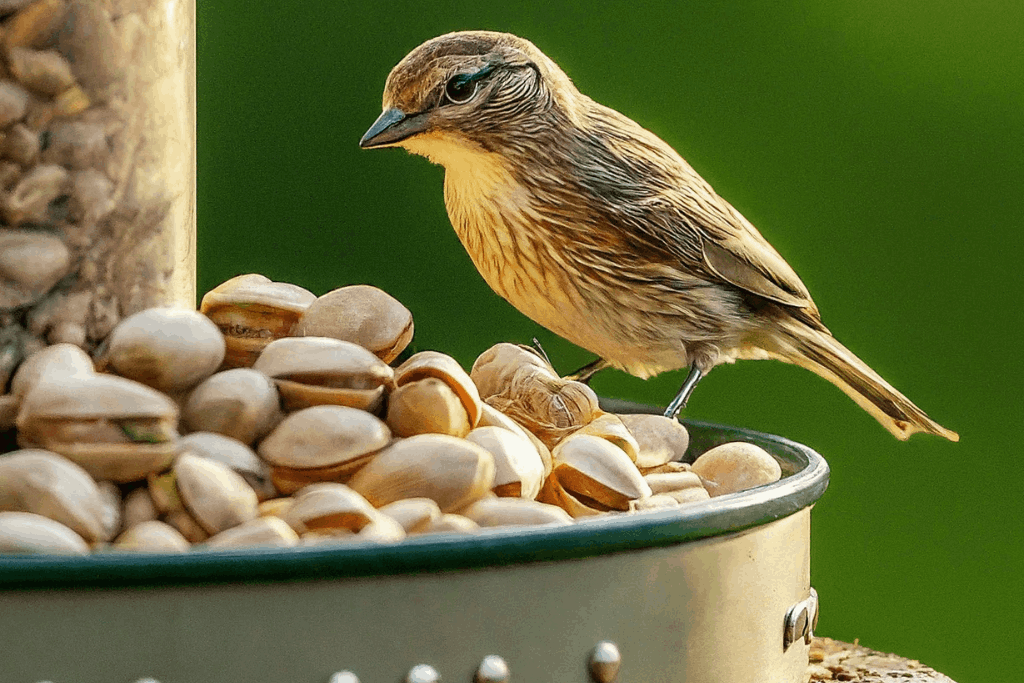
Introduction to Feeding Pistachios to Birds
As bird lovers, we often wonder what treats our feathered friends might enjoy. Pistachio nuts are one food that has caught our attention. But before we can feed them to our birds, we need to know what pistachios are and why birds love them.
What are pistachios and why can birds enjoy them?
Pistachios are a type of tree fruit that grows on hard green rocks. They are loved for their unique taste and smoothness. Many bird species consider these eggs a delicacy.
These eggs are packed with protein, healthy fats, and a variety of vitamins and minerals. This makes them the forage of choice for birds.
To understand the potential risks and benefits
It can be tempting to feed pistachios to birds, but we need to weigh the risks and benefits. Some birds may have difficulty digesting pistachios, which can cause health problems. Nevertheless, the nutritional value of pistachios can provide important nutrients for birds, in all species and requirements.
By understanding pistachio feeding information for birds, we can make wise choices. This keeps our feathered friends healthy and happy. Next, we examine the nutritional value of pistachios for birds and safety considerations when offering them as a treat.As bird lovers, we often wonder what treats our feathered friends might enjoy. Pistachio nuts are one food that has caught our attention. But before we can feed them to our birds, we need to know what pistachios are and why birds love them.
Nutritional Value of Pistachios for Feathered Friends
Feeding our birds the right foods is crucial. Pistachios, a favorite snack for people, might also be good for birds. But what do these nuts offer in terms of nutrition for our birds?
Pistachios are packed with protein, healthy fats, vitamins, and minerals. These can help keep a bird healthy and happy. They have lots of vitamin B6, thiamine, and copper. These are key for feather growth, immune health, and energy in birds.
They also have antioxidants like lutein and zeaxanthin. These help with eye health and vision in birds. Plus, the fiber in pistachios supports digestive health and regularity.
When thinking about pistachio nuts nutrition for birds, remember to give them in moderation. Too many pistachios can cause weight gain or imbalance in nutrients.
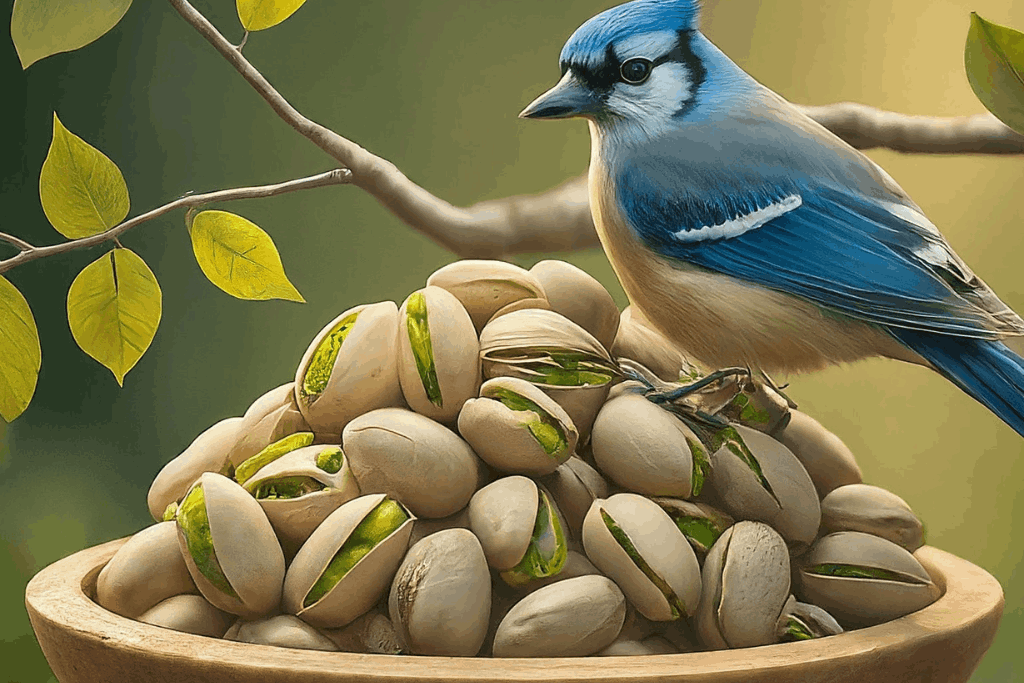
Can Birds Eat Pistachios? Exploring the Safety Concerns
Pistachios might look like a tasty snack for birds, but they come with safety risks. As bird owners, knowing the dangers of pistachios is key. It’s important to understand the risks before feeding them to our feathered friends.
Potential Risks of Feeding Pistachios to Birds
Pistachios have a compound called aflatoxin that can harm birds. Aflatoxin is a toxin that can be in nuts, grains, and other foods. If birds eat too much, it can hurt their liver, weaken their immune system, and even cause cancer.
The hard shells of pistachios can also be a problem. Small birds might not be able to open them, leading to blockages in their stomachs.
Signs of Pistachio-Related Issues in Birds
Watch your bird closely if they eat pistachios. Look out for signs like:
- Lethargy or decreased activity
- Loss of appetite or
- decreased food intake
- Vomiting or diarrhea
- Feather loss or poor feather condition
- Jaundice or yellowing of the skin and eyes
If you see these signs, see an avian vet right away. Quick action can prevent serious health problems for your bird.
In short, pistachios might look good, but be careful with them. Knowing the risks and watching for problems can keep your bird safe and healthy.
Bird-Safe Nut Alternatives to Pistachios
Pistachios might also appear like proper food for birds, but it’s best to make a safe preference. There are many chook-evidence nests which can be correct in your birds. These end result can provide you with complicated and attractive food.
Healthy vegetable treats on your chook companions
Almonds are a splendid substitute for pistachios. Packed with protein, wholesome fat, and crucial nutrients and minerals. These may be good for plenty birds while fed sparingly and prepared properly.
- Cashew nuts also are secure for birds like hawks and owls. First, though, ensure they’re salt-free and roasted. This makes them safe in your birds to devour.
- Walnuts are full of omega-3 fatty acids that assist the birds’ coronary heart and basic health.
- Macadamia nuts may be an alternative, however be careful. Too plenty may be bad for a few birds.
Watch their reactions as they are attempting new eggs with birds. Slowly add those safe eggs to their food plan. Watch out for any cues they don’t like or can’t handle well.
| Nut | Nutritional Benefits | Potential Risks |
|---|---|---|
| Almonds | High in protein, healthy fats, and essential vitamins and minerals | Should be provided in moderation due to their high-fat content |
| Cashews | Nutritious and can be enjoyed by various avian pets | Must be unsalted and roasted to ensure safety |
| Walnuts | Rich in omega-3 fatty acids, which can support heart health and overall well-being | Should be offered in moderation due to their high-fat content |
| Macadamia Nuts | Potentially nutritious, but with caution due to potential toxicity in large quantities | Must be closely monitored, as they can be toxic to some bird species |
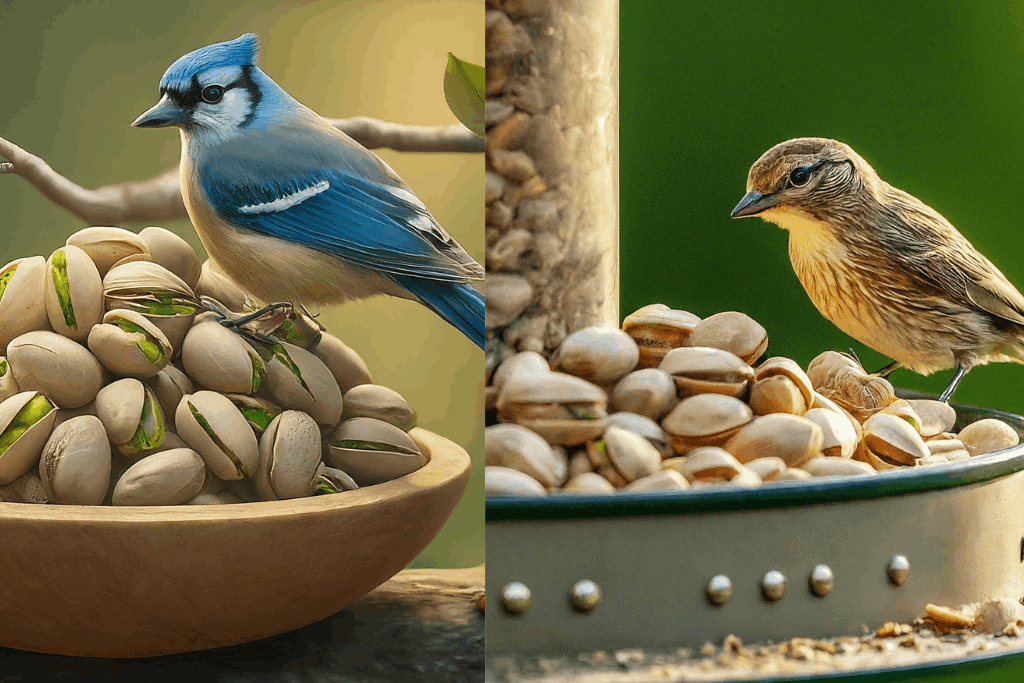
Proper Serving and Storage Tips for Pistachio Treats
If you have found out which can birds devour pistachios, it is key to recognize a way to serve and shop them. Make sure to do away with the hard shells earlier than giving them in your birds. These shells can be a choking danger or reason stomach problems. Give out small quantities because pistachios are excessive in fat and ought to be given moderately.
For pistachio shells and chicken protection, hold any shelled pistachios in a sealed container inside the fridge or freezer. This continues them fresh and full of nutrients. When it’s time to offer them for your birds, allow the pistachios warm up to room temperature first. This enables avoid any belly disillusioned from ingesting bloodless food.
If you are feeding pistachios to parrots or different birds, pay attention to what they like and want to consume. Some birds would possibly like pistachios as a unique treat, even as others may opt for unique nuts. Always speak in your vet to make sure you are giving your bird the fine snacks for their fitness.
FAQ
Can birds safely eat pistachios?
The answer is not straightforward. Pistachios can be good for birds in small amounts. But, they also have risks that you should think about. It’s key to know the good and bad before giving them to your birds.
What are the potential benefits of pistachios for birds?
Pistachios offer protein, healthy fats, vitamins, and minerals. These can be good for birds in small amounts. They have vitamins like B6, K, and thiamin, and minerals like copper, manganese, and phosphorus.
What are the potential risks of feeding pistachios to birds?
Feeding pistachios to birds can be risky. The main issues are choking hazards, digestive problems, and toxins. Pistachio shells can choke birds, and the nuts are high in fat and salt. This can upset their stomachs. Some birds might also react badly to pistachios.
How can I competently provide pistachios as a deal with for my birds?
If you need to present pistachios in your birds, take the shells off and give them a touch bit as a special treat. Watch how they react and prevent giving them in the event that they appear sick or uncomfortable. It’s generally safer to provide them other nuts and seeds as treats.
What are some healthier nut alternatives to pistachios for birds?
Better nut choices for birds consist of unsalted, shelled almonds, walnuts, and cashews. These are usually more secure and better for birds. You also can try exceptional seeds like sunflower seeds, millet, and safflower seeds. These can be a delectable and healthful deal with for your birds.



